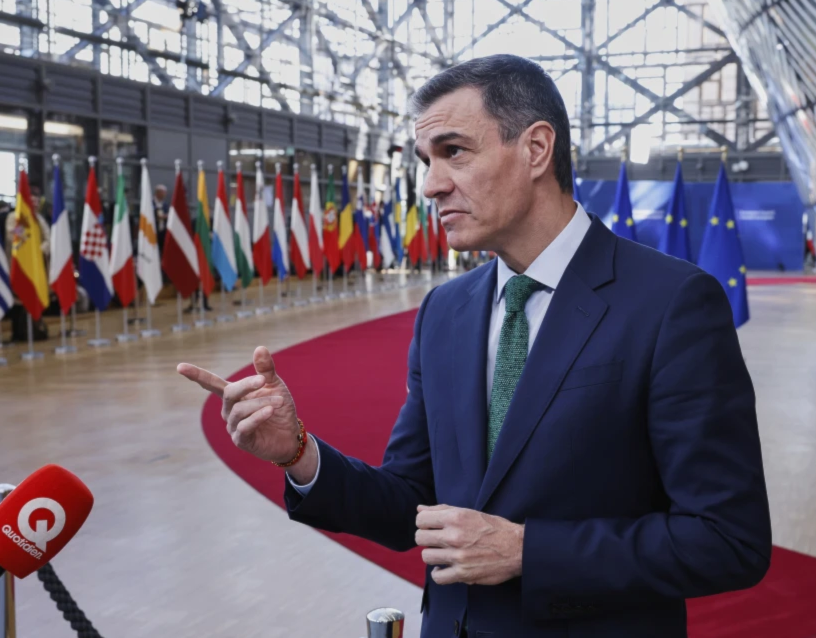Spain unveils $15.66 billion plan to protect economy from US tariffs
The Spanish government is implementing a $15.66 billion plan, including soft loans, to mitigate the economic impact of US 'Liberation Day' tariffs.
-

Spain’s Prime Minister Pedro Sanchez speaks with the media as he arrives for an EU Summit at the European Council building in Brussels, Thursday, March 6, 2025 (AP Photo/Omar Havana)
Prime Minister Pedro Sánchez announced that the Spanish government will implement a €14.1 billion ($15.66 billion) plan to mitigate the impact of the new U.S. tariffs on the Spanish economy.
Sánchez stated that the package will include €7.4 billion ($8.17 billion) in new financing, with the remainder coming from existing instruments such as soft loans.
Soft loans are financial instruments provided by governments or financial institutions under favorable terms, including low or zero interest rates and extended repayment periods, to stimulate economic activity and support specific sectors. In Spain, these loans are issued by the Official Credit Institute (ICO), a state-run financial entity that operates in compliance with EU regulations and guidelines.
Sánchez also urged the European Commission to establish a fund financed by revenue from increased tariffs on U.S. imports, introduced in response to what he described as an "unfriendly and unjustified" move.
Additionally, Sánchez sought EU authorization to grant greater flexibility for large-scale domestic aid to affected sectors, such as the automotive industry.
According to Trading Economics, a platform that compiles data from 196 countries and provides historical records and forecasts for over 20 million economic indicators, Spain's primary imports from the United States in 2024 included:
- Mineral fuels, oils, and distillation products (~$10.72 billion)
- Pharmaceutical products (~$6.86 billion)
- Machinery, including nuclear reactors and boilers (~$2.58 billion)
- Optical, photographic, technical, and medical apparatus (~$1.56 billion)
- Aircraft and spacecraft (~$1.32 billion)
- Oil seeds, oleaginous fruits, grains, and seeds (~$977.2 million)
- Vehicles, excluding railway or tramway (~$868.12 million)
The Spanish measures serve as "a safety net that, in the short term, will protect those experiencing declining sales" due to the tariffs announced by U.S. President Donald Trump on Wednesday, Economy Minister Carlos Cuerpo said earlier.
The European Union remains eager to negotiate and prevent a trade war, though it will be forced to retaliate if no diplomatic resolution is reached, Cuerpo added.
"Liberation Day" tariffs
The below White House Tweet provides a side-by-side comparison of tariffs charged to the USA, and the corresponding "discounted reciprocal tariffs" that will be implemented this April 5, 2025.
The "tariffs charged to the USA" are those imposed on US exports by foreign markets, which are meant to increase the cost of US goods in foreign markets, making them less competitive. While "US discounted reciprocal tariffs" are the tariffs the US applies to imports. The EU imposes a 39% tariff, while Trump hit the EU with a reciprocal tarrif of 20%.
LIBERATION DAY RECIPROCAL TARIFFS 🇺🇸 pic.twitter.com/ODckbUWKvO
— The White House (@WhiteHouse) April 2, 2025
"This tariff attack by the US administration makes no distinction between friends and enemies, it doesn't discriminate based on ideology or trade balance; it's against everyone and everything," Sanchez said.
The European Parliament Trade Committee Chair said yesterday in a press release, “While President Trump might call today 'Liberation Day', from an ordinary citizen's point of view, this is 'Inflation Day'. These unjustified, illegal, and disproportionate measures can only lead to further tariff escalation and a downward economic spiral for the US and the world as a whole. Because of this decision, US consumers will be forced to carry the heaviest burden in a trade war. These tariffs will only make processes and manufacturing more inefficient."
"The consequences will be dire for millions of people around the globe," EU Chief Ursula von der Leyen said in a statement, adding that the European Union is planning on retaliating to the levies imposed by Trump should talks with the US falter.
These threats should be taken side by side with similar exchanges that took place last month.
Sector-specific tariffs
Last month, the Trump administration officially increased tariffs on all steel and aluminum imports to 25%, with duties on industrial and agricultural products that went into effect April 1, 2025.
The European Commission President Ursula von der Leyen announced retaliatory trade action mid-March, with measures that will cover goods from the United States worth some 26 billion euros ($28 billion), not just steel and aluminum products, but also textiles, home appliances, and agricultural goods.

 4 Min Read
4 Min Read










